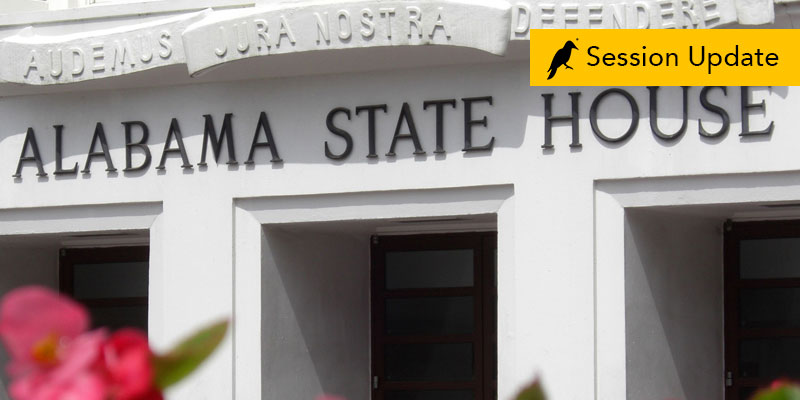MONTGOMERY — The Alabama Senate Banking and Insurance Committee on Wednesday held a public hearing on SB 227, which is sponsored by Sen. Tom Butler (R-Madison).
While it has flown under the public radar thus far, the bill could potentially be one of the most costly pieces of legislation for hardworking Alabama families proposed in recent memory.
As explained during the public hearing, the measure would interfere with the ability of pharmacy benefit managers (PBMs) to negotiate lower prescription drug costs for Alabamians on group health insurance plans, including self-insured plans and other employer-based plans.
Butler, a pharmacist by trade, asserts that independent pharmacies are being hurt by PBMs. Opponents of the bill argue that PBMs save customers money, which is a good thing for the public at-large.
Justin Wright, executive vice president and chief financial officer of Abbeville’s Great Southern Wood Preserving, explained to the committee that the company utilizes a self-insured health care plan as a benefit for its employees; as such, the plan is covered between the company and the employees participating in the plan, which means that any increased costs fall on the company and the participating employees.
Voluntarily using two PBMs, Wright said that Great Southern Wood’s health care plan costs have gone down twice and stayed level twice over the past four years.
“If this bill were to pass [and] these PBMs are limited in their ability, we think it’s a cost of roughly $1.1 million (annually) to us,” Wright advised. “To put that into a per employee number, that is $1,079 (each) that would have to come out of our employees’ pockets.”
That per employee cost hike would represent an increase of between 50-130% on employees’ current payments, depending on the exact employee.
Wright subsequently outlined how, as the architect of their own plan, Great Southern Wood incentivizes its participating employees to patronize community pharmacies rather than big-box chains; this practice ends up saving the plan money while supporting locally owned businesses at the same time — and all while utilizing PBMs.
Another opponent of the bill on the day was Danny Rickert, chief policy officer for the University of South Alabama (USA) and USA Health. He underscored that USA is the largest employer in Mobile, with around 7,000 employees and 11,000 covered under USA’s self-insured health plan.
“Senate Bill 227, regarding PBMs, is going to be detrimental to the people who pay our premiums,” Rickert affirmed. “That’s both us — the university — as well as me — an employee — and all of our employees who cover the cost of our premiums.”
He added that SB 227 would essentially guarantee premium increases for those participating in USA’s employee health plan, which successfully utilizes a PBM on a voluntary basis.
Rickert stated that if the bill were to pass in its current form, the measure would cost USA employees between $4.6 million and $5.5 million annually. Per USA health plan contract holder, this would break down to between $940 and $1,100 per year.
David Cole, senior vice president for governmental affairs at the Business Council of Alabama (BCA), also spoke during the public hearing. BCA represents nearly one million working Alabamians through its member companies and local chambers of commerce, and Cole outlined that the huge cost increases projected by Great Southern Wood and USA are not unique to those two major employers under SB 227.
“The responses that we have gotten from businesses, our members from Main Street, are significant,” he shared. Cole said businesses of all sizes from the likes of Birmingham, Tuscaloosa, Fayette, Alabaster, Greensboro and Mobile had similarly expressed serious concerns with the legislation. Those that have already provided feedback to BCA with specific numbers projected annual per-employee cost increases of approximately $1,000, “in line with” Great Southern Wood’s and the University of South Alabama’s numbers. One employer, for example, estimated an increased annual cost of about $4.5 million on the business, as well as an increase of $950 for each employee per year.
He stressed that the bill would be “an increased cost burden on the backs of hardworking Alabama families.”
Cole also raised the point that SB 227, in addition to increasing costs, would decrease pharmaceutical options for Alabamians.
While some of the above numbers are certainly jarring, the most eye-opening remarks of the public hearing may have come from Diane Scott, the CFO for the Retirement Systems of Alabama, which oversees the Public Education Employees’ Health Insurance Plan (PEEHIP).
According to information provided to the committee, PEEHIP’s PBM saved the health plan an estimated $586 million in drug costs in 2020 alone.
PEEHIP is funded by both the state Education Trust Fund budget and the premiums paid by participants in the plan: mainly Alabama’s public school teachers.
While voluntarily utilizing a PBM to implement cost savings, PEEHIP has requested level funding from the legislature for six consecutive years, and its funding remains below 2008 levels. At the same time, PEEHIP has not increased member out-of-pocket costs since 2016.
Scott told the committee that SB 227 would carry an estimated cost increase of at least $159.7 million for PEEHIP through FY 2023, which would have to be passed onto public educators, the ETF budget (paid for by tax dollars) or a combination of the two.
She specified that the total shortfall facing PEEHIP in FY23, should SB 227 pass, would equate to a per-member rate increase from $800 to $972 per month from the ETF; alternatively, PEEHIP would have to raise premiums on public education employees by $1,283 annually ($106.92 monthly).
Indeed, PEEHIP would not be the only public-sector self-insured health insurance plan affected by the bill.
The fiscal note prepared for the bill confirms that SB 227 “would affect state, county or municipally-funded health insurance programs by an undetermined amount dependent upon several variables.”
Sean Ross is the editor of Yellowhammer News. You can follow him on Twitter @sean_yhn













